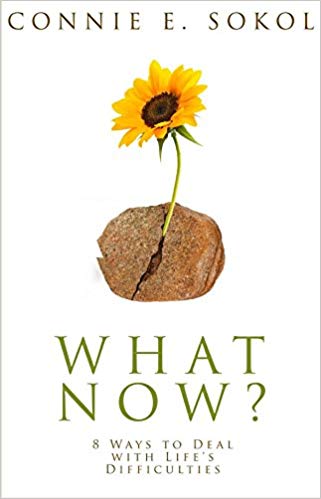Listen to the full episode on iTunes:

Hi everyone! This is Connie Sokol, and you’re listening to Balance Redefined Radio. I’ve spent over 20 years teaching people how to redefine what balance really is, meaning a more purposeful and joyful life.
They’ve paid off credit cards, lost weight, organize their homes, and created a meaningful life plan and they’ve managed their time, changed habits and experience greater success both at work and at home.
So now I decided to take the plunge and help about 100,000 new people who want to redefine balance in their lives. People ask me all the time, “How do I go from an overwhelming and chaotic life to more purpose and organization and joy?”
That’s the reason why I’m doing this podcast, to give you trusted answers and create a space where you could find balance. My name is Connie Sokol and welcome to Balance Redefined Radio…
[00:00] Welcome back to Balance Redefined. I’m Connie Sokol. I have some great stuff to share with you today on achieving your goals-not just talking about them, not just running them down, but actually achieving them. I read this information in the One Minute Manager. I love this book.
[00:17] It’s by Kenneth Blanchard and Spencer Johnson. It’s a go-to. It’s a classic. It’s timeless. I love this book…
[00:22] I was reading about how you set your goals and how effectively to set your goals so that you can actually achieve your goals.
[00:29] And there was this one concept that I really wanted to get across and make you aware of because it was powerful to me and has been a huge help in me successfully achieving my goals.
[00:40] So the first kind of thing I want to share to put this in a clear perspective and put it in a tangible terms is a story that I had heard before.
[00:52] It is a true story about a flight and airline flight. It was back in 1979 and it was a flight that was taking off from New Zealand and doing a sightseeing flight to the Antarctica. It was a flight that had been done many times before, so it was pretty routine…
[01:07] But what the people on the plane and what the pilots did not know is that somebody had accidentally modified the planes course and the plan by two degrees, just two degrees.
[01:19] So what happened is they are flying that two degrees, took them significantly off course and in fact in the path of an active volcano, but because everything was so white with the clouds, the ice, the snow, and the mountains that these pilots did not realize they were in trouble until it was too late.
[01:38] They crashed into the side of the mountain of the volcano and everybody on board died.
[01:42] Now, I’m not going to stay and dwell on that, but the reason why I talk about that is because that story stuck with me. I heard that years and years ago.
[01:51] It stuck with me of the importance of correcting our course trajectory and doing it quickly.
[01:59] Not waiting until we have dug those neuro-pathways and dug those emotional and mental trenches so deep that it takes so long for us to get out.
[02:08] It’s course correcting quickly.
[02:10] Yeah, try saying that three times fast. You probably can course correct quickly. So as we do that, we’re able to achieve our goals quicker, more enjoyably…
[02:22] I’m able to connect those goals to other goals because we can see, “Wow, I need to fix this here,” and then that dominoes into maybe two or three other areas we didn’t even anticipate, but it’s just that beautiful positive fallout.
[02:35] So keep that story in mind of quickly course correcting.
[02:41] I want to talk about what the book shares.
[02:43] Now the first thing to do is determine do you have an actual problem? And I love this in the book that is uses different storytelling formats to teach lessons such as Rich Man, Poor Man.
[02:58] But he says in here that the manager has come to him and said, “Oh my gosh, we’ve got a problem.” And he says, “So tell me, not about feelings or attitudes. Tell me what’s happening in observable, measurable terms.”
[03:12] And so then he describes problem, then he says, “Okay, now tell me what you’d like to have happen. What do you want to have happen or be happening in those same terms?” And he’s like, “Well, I don’t know.”
[03:22] And then the man says, “If this is so pivotal, if you can’t tell me what you’d like to be happening, you don’t have a problem yet, you’re just complaining.”
[03:33] “A problem only exists if there is a difference between what is actually happening and what you desire to be happening.” Isn’t that fabulous?
[03:43] So let me read that again…
[03:44] “If you can’t tell me what you’d like to be happening, you don’t have a problem yet, you’re just complaining.” A problem only exists if there is a difference between what is actually happening and what you desire to be happening.
[04:00] So keep that in mind. First, determine, do I have a problem or am I just whining? Do I just need a pint of Ben and Jerry’s or really good Brownie, or do you actually have a problem?
[04:10] If you have a problem, then that’s good because then we go to the next step. He gives six particular points to consider on your one minute goal setting and the first thing he says is to agree on your goals.
[04:24] Agree on your goals. What that says to me is choose your goals. What is it that you actually want to do and just like I shared in that little quote, what would you want to have happen? Not just complain about what isn’t happening, right?
[04:39] That’s what we want. So once you figure out what that looks like, then you can start determining the number one word that was so powerful to me about actually achieving your goals and this behavior.
[04:53] He talks about how this behavior will determine if your goals are being achieved…
[04:59] Now you can also insert habits in there which Charles did…
[05:01] He talks about that same thing, with these behaviors.
[05:09] I share that beliefs and behaviors will change your actions because behaviors are different than just making a choice here and there. Behaviors are those ingrained things that become those habits that are really what make-up you, your daily you.
[05:26] That’s going to be you five years down the road, so you want to consider those beliefs and behaviors because those are going to determine your actual outcomes of who you are and what you want.
[05:37] So agree on your goals, which means agree what it is you actually want to achieve…
[05:41] Really not just a should or what your mother in law says or what your boss says. What are the goals that you feel strongly you need to achieve? Okay, and then the second is to see what good behavior looks like.
[05:54] What is the matching behavior that you’re going to need in order to make that goal happen? Have you thought about that? What kind of behavior are you going to need?
[06:03] If you want to lose weight? Well, what’s a behavior you’re going to need to start doing or a behavior you’re going to have to incorporate or embrace for you to actually do that?
[06:13] I had to do that a few months ago. I was like, you know what? I need to shift. I was doing the same workout I’ve been doing. I was being kind of like, “Oh, we have a lot of life stressors going on,” and so I thought I need to do that for the health and the wellbeing and the distressing.
[06:27] And so I had to figure out my schedule. I looked at it and went, “Wow, work that my first phase of kids leaves about seven, 10 and my last one leaves about 8:00. So I get him ready by about 7:30, 7:40.
[06:43] So I have about 20, maybe 30 minutes in there for me to work out. And so that’s what I did. Even though some mornings I think, “Oh my gosh, can I squeeze one more thing?”
[06:52] And then you don’t want to go the opposite because then if you stress yourself out too much and trying to make it work, then you just raise your cortisol level, which just makes your exercise worthless.
[07:02] So you know, try to find the balance.
[07:04] So I started doing it at 7:10, and guess what? I have loved it. It’s worked out great. I get this workout done and I’m not punishing myself and killing myself with a workout. It’s enjoyable.
[07:16] It zumba it’s ballet-beautiful. It’s doing pilates. It’s doing things that I love and enjoy so that by the time my son wakes up, I’m getting him ready, and he’s ready to go, it’s good.
[07:28] It’s nice. After that I hop in the shower and all is good.
[07:30] So what behavior do you need to incorporate or let go of in order for you to make that goal happen?
[07:37] And then the third thing they say is to write out each of your goals on a single sheet of paper using less than 250 words.
[07:45] So write out each of your goals, put them on a single sheet of paper and use less than 250 words. Then read and reread each goal-which requires only a minute or so each time you do it.
[07:59] So do you understand what that means? You should just write it out. Just make it very easy to read, easy to remember. And then during a given day, take that sheet and then just read and reread each goal, which only takes like a minute or so when you want to just review it.
[08:13] Make sure you remember what it is. And I would encourage you to choose a time of day that you are actually will do that…
[08:19] So whether it’s first thing in the morning when you’re getting ready, if it’s the last thing before you hit your pillow at night or is it in the afternoon while you’re waiting for Carpool or whatever that might look like for you…
[08:29] Maybe you are thinking, “Okay, I always have our administrative meetings this time and I have this 15 minute block where, or 10 minutes that it’s really unaccounted for.
[08:38] But I just kind of have to make the best of it and go on social media or whatever.”
[08:42] Use that time to review your goals…
[08:44] Remember, studies show that if we keep it in the front of our brain, if we keep it in that active part, then our bodies and minds and soul will actually try to make it happen.
[08:55] If it’s in the front of our brain, that’s the first thing our brains going to go to that needs to be done or taken care of or addressed. So we want to keep this front and center and keeping our goals right in front of us.
[09:07] That’s why it’s so important to keep rereading them.
[09:09] Then the next one he has number five is take a minute every once in a while out of your day to look at your performance.
[09:16] So just take that five minutes and just evaluate your performance…
[09:21] And then the last one he says is to see whether or not your behavior matches your goal. So again, this is Kenneth Blanchard and Spencer Johnson, check and see, just do this quick check.
[09:32] Maybe it’s one minute, maybe it’s two minutes, five minutes, but just look at those goals and then say, “Okay, how’s my behavior doing? Isn’t matching these goals? Is it getting me where I want to go?”
[09:43] Preferably read them right as you’re about to stick a huge donut in your mouth and you’re like, “I really, really want to feel and be healthy. I want to be my best self.”
[09:54] Well read that goal and then you can really decide, do I really want that doughnut?
[09:58] Maybe you do, or do I not do I want what really matters to me now and in the long run because all of this is going to add up and it’s going to make me into a better person if I keep making those behavior choices today because what is it going back to?
[10:13] What’s the goal you agreed on at the very beginning and go through those steps. Now, the last one that I would add is adjust. If you can see that it’s not working, then make that course correction quickly, right?
[10:28] You want to adjust as soon as you can…
[10:31] I think about that. In fact, as I was writing down some notes for this, I wrote down a thought about the difference between the airplane analogy that I gave you and the plan that we make our goal setting plan, and it hit me that the difference between the plan and the plane is the difference of one letter and a few degrees.
[10:52] So same the principle applies to your goal plan as well as the flight of a plane and that is to quickly course correct.
[11:02] As you make those small little changes and you make those very small, tiny, seemingly inconsequential choices, you will find your compound effect in play.
[11:13] You’ll find that your goals are actually happening when you put down that one donut, you know donuts are going to be there forever, so well, you know maybe, but they’re going to be there for a while.
[11:24] They’re going to be there for months and years ahead. You’re not going to miss out on anything. So even thinking sometimes what helps me is even thinking just for today, then I don’t go into denial. I go just for today, I’m just going to work out for 15 minutes just for today.
[11:39] I’m going to put that donut aside because I can get one next week just for today. I am going to go to bed at a good time just for today. I’m not going to lose my temper over these things that are just not that important. They’re just not. I’m not going to get upset about it just for today.
[11:55] I’m going to make sure and do that extra service for my kids that they don’t even know they’re getting. If I can do that principle just for today, I actually achieved more of my goals than if I think I’ve got this three month, two year plan in place that I am stuck to you like glue.
[12:13] It helps me to be able to say, you know, I don’t have to do this forever, but just in this moment I’m going to make this choice. And guess what?
[12:21] Those moments and those choices, they add up, they multiply and they become. They become you. They become those goals that you’ve really, truly wanted to be and become and achieve, so some food for thought for today.
[12:37] As always, you’re welcome to check out my Five Keys to Balance Redefined master class. It’s free and it’s got more fabulous life hack tips for you to be able to put into practice right now.
[12:49] So, so fabulous. The feedback is phenomenal on it. I love it and I can say that because people have told me this. I have loved that they are getting such good stuff out of it and it’s shifting their life. That makes me so happy.
[13:00] And you can also, as I said, get my newsletter, go conniesokol.com, and you can also get our free joy challenge.
[13:05] So if you’re needing a little bit more joy in your life and that’s one of your goals, then take our free joy challenge with thoughts and wonderful activities, small things, that you can do just in a blink of an eye every day to increase your joy and it actually works.
[13:18] It actually increases that joy. So enjoy more podcasts by clicking on yet another from balance, redefined.
You got it. Thanks for listening and remember to rate and subscribe. And if you are feeling the need for real balance in your life, get your free 3-Step Life Plan, and get started today! Just go to conniesokol.com/download.

